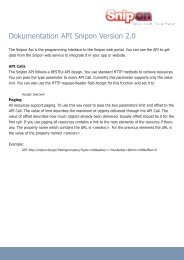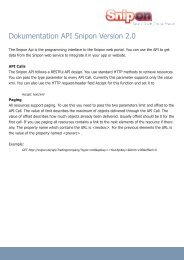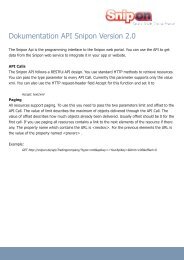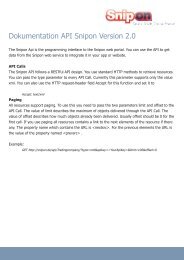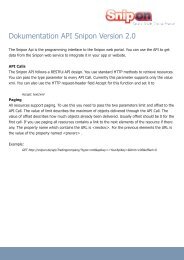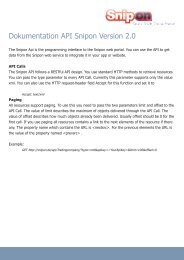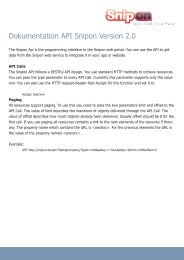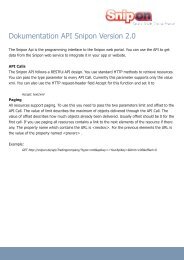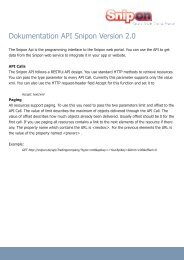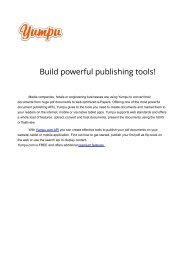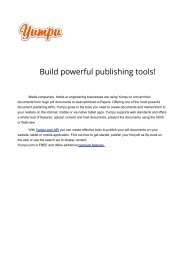test_pdf.pdf
You also want an ePaper? Increase the reach of your titles
YUMPU automatically turns print PDFs into web optimized ePapers that Google loves.
SENA<br />
ENATOR<br />
JOSEPH<br />
BIDEN<br />
If you had two spheres of highly enriched uranium about the composition of the base of the glasses you have on<br />
your table and were able, at high speeds, push them together in a rifle device—which they had just constructed for<br />
our edification—you would have a minimum one kiloton nuclear explosion that had it been at the base of the<br />
World Trade towers, it would have brought them down, I believe, within eight seconds and killed over 100,000<br />
people because of the blast and the radiation that would flow from that.<br />
This is not a concern that is exaggerated. But it is hard getting that fissile material. That is the real tough part.<br />
But we know it is a desire. So if an educated terrorist got fissile material, especially highly enriched uranium, it has<br />
been proven to me beyond a reasonable doubt that it is within the possibility, of the realm of reality, that they could<br />
in fact construct a homemade nuclear device. Similarly, if they were to steal or be given a nuclear weapon, they<br />
could probably use it or take it apart to build their own device.<br />
If we are to avoid nuclear terrorism in the future there is no more critical effort today than securing the world’s<br />
fissile materials. Most of the poorly secured materials are in Russia, and arguably Pakistan, but there is so much<br />
highly enriched uranium and research reactors scattered around the world that we should be concerned. Three<br />
years ago Howard Baker and Lloyd Cutler called upon us to spend at least $3 billion a year on a Nunn-Lugar type<br />
crash program to secure Russia’s fissile material. Today the world spends only $1 to $2 billion on this. Several U.S.<br />
programs are stalled by longstanding liability disputes and not promoted because of the ideologues within this<br />
administration who view Nunn-Lugar monies as being fungible monies. In other words, if we pay to destroy their<br />
weapons, or this material, or to corral it—they are going to take the money they would have spent anyway and do<br />
something very bad with it. I find that logic fascinating.<br />
U.S. and Russian bureaucrats are worrying too much about turf and too little about our shared need to ensure<br />
that fissile material is kept out of the hands of rogues and terrorists. The U.S. and Russian presidents need to take<br />
a hands-on approach, end the bureaucratic battles, which will not end unless they intervene, and restore a spirit of<br />
cooperative problem solving. It is long overdue and dangerous for us not to pursue that.<br />
Similarly, our efforts to repatriate fissile material from other countries’ nuclear reactors are laudable, but it is<br />
hardly sufficient. At the rate we are going it will take over a decade to finish the task. And that exposes us for much,<br />
much too long to the risk of true catastrophe. We need a major increase in our efforts to safeguard the world’s<br />
enriched uranium and in funding and in the urgency with which we pursue this program. We need greater efforts<br />
to secure radioactive sources that could be used in a so-called dirty bomb. I just came from a hearing that Senator<br />
Lugar and I conducted on the Council of Foreign Relations’ report on Pakistan and India. There is an overwhelming<br />
concern about the production of a dirty bomb because of the lack of safeguards that exist within Pakistan<br />
particularly—and the environment in which it exists.<br />
So we need a crash program to replace nuclear generators in Russia’s remote lighthouses, which are already<br />
being vandalized by thieves and could sometime, someday be stolen by terrorists.<br />
We need to maintain nuclear deterrence—even in a world of international terrorism. One useful step would<br />
be an international compact in which nations agreed to wipe out any group that dared set off a nuclear device.<br />
A step we can take now would be to improve our ability to collect and analyze nuclear debris so that we can<br />
identify, and if appropriate, retaliate against any country supplying fissile material used in such an attack. At least<br />
if they know we have that capacity, it may be—although small—a deterrent. My amendment on this passed the<br />
Senate last year but it died in conference and I plan to keep pressing this issue.<br />
There is so much more to say about what we should be doing. But let me conclude by saying to suspend<br />
nuclear proliferation and avert nuclear terrorism we must loose the bonds of ideology. We must invent new<br />
approaches and foster new international cooperation to meet the changing threats.<br />
In the nuclear age, a Hobbesian world can be nasty, brutish and very short-lived indeed. Our military might<br />
is a vital force for good in this world but we must also seek the Lockean alternative of agreed restraints and<br />
responsibilities. For if we give up on that, I believe we are lost. If we are as clear headed as Paul Warnke was, we<br />
even may succeed.<br />
Thank you, very, very much.<br />
(Applause.)<br />
MR. ISAACS: We have time for a few questions. If you would like to speak, raise your hand and then go to the<br />
microphone. We will start in the back.<br />
Q: Senator Biden, my name is Benjamin Hu and I am a reporter with The Washington Times newspaper. This<br />
morning the wire services carried an item that North Korea has signed a compact of some sort with Nigeria to shift<br />
ballistic missiles to Nigeria. What effects does this have on the focus of nonproliferation and what do you feel the<br />
45<br />
45



